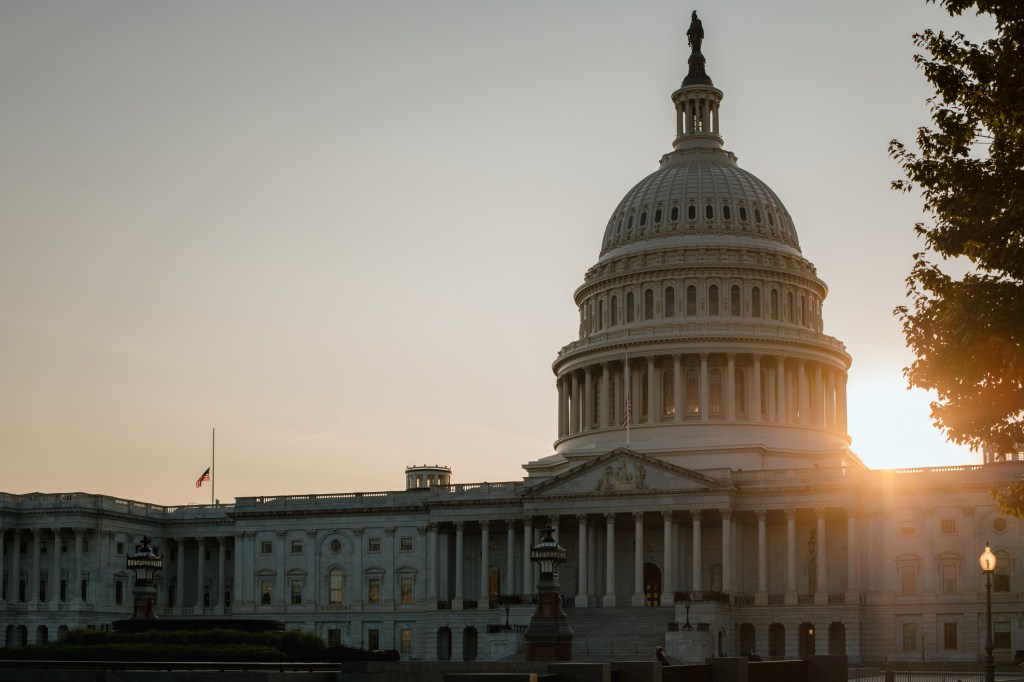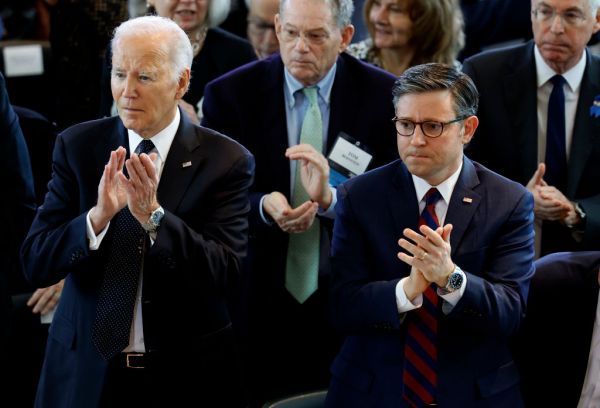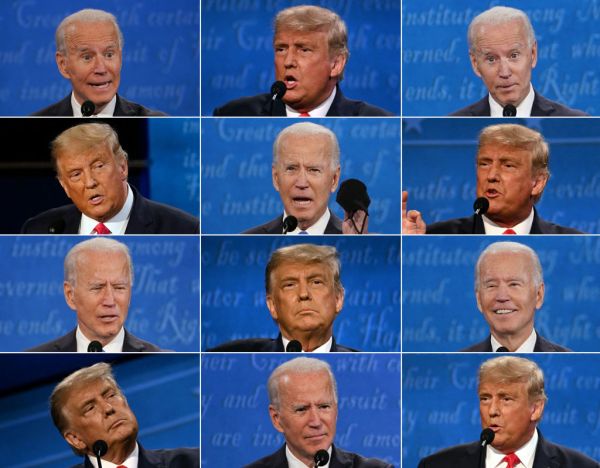Please forgive a little shoptalk up front. I just got back from Houston for a Dispatch meet-up. It was great fun. We met a bunch of really wonderful people, and their heartfelt appreciation for what we’re doing was profoundly encouraging. Thanks again to our sponsors and hosts and everyone who came out.
I didn’t watch Trump last night, but—while there’s always more to argue about when so many people start from the conclusion and argue backward—nothing has really changed since I wrote last Friday’s “news”letter.
So let’s talk about something more serious.
I had a great conversation with my AEI colleague Philip Wallach last week on his new book, Why Congress. As longtime readers know, I’ve been obsessed with Congress’ dysfunction for a long time now. But Wallach’s book added a dimension I hadn’t fully thought through before.
For very understandable reasons, we tend to confuse or conflate democracy and representation. It’s understandable, at least in part, because our representatives—both in the House and the Senate—are elected democratically. The president, also elected democratically (for the most part; we’ll put aside the Electoral College stuff for a second), is sort of supposed to be the representative of the whole country. That’s certainly his role diplomatically, as head of state and that kind of thing. But as I’m wont to point out, the president rarely actually represents the will of all of the people. Even during a war, when large majorities rally around the president, there are always dissenters. The truth is, the president is the head of just one branch of government, and most of the time he usually represents the interests and goals of his party, its donors, and a few snippets of swing voters who voted for him—or against his opponent.
Moreover, as much as it may clang off the ear of some people when I say it, the president shouldn’t try to represent the views of all—or even a majority—of the voters if the voters are wrong. The president is supposed to think of the long-term interests of the nation, and that means thinking about future generations. A good president will, when required, try to persuade voters to think beyond their immediate interests. Then again, sometimes presidents think they’re doing that when actually they’re the ones who are wrong and the voters are right. In short, it’s messy.
But this kind of democratic representation is only a small slice of what we mean by representation. For instance, champions of “diversity” will often argue that corporate boards, talk shows, student bodies, university faculties, the casts and crews of films and TV productions, newspapers, museum staff, and just about everything else in life should be “representative.” In the vast majority of these cases, democracy has little to nothing to do with it. You can read the thousands of books and op-eds about the need for demographically “representative” college admissions and the word “democracy” will rarely enter into it—beyond some pious crap about how the health of our democracy depends on schools being able to (undemocratically) decide who should get accepted and who shouldn’t.
Most people have been part of some meeting where someone says, “You know we should have someone from sales or accounting or legal in here for their input.” That’s representation, too.
The United Nations is a “representative body” but it’s not actually a democratic body. Sure, there’s a lot of voting, but the votes of the general assembly can be overruled by the Security Council and the Security Council is based on might-makes-right power, not democratic legitimacy. Indeed, two of the members of the Security Council—and scores of nations in the full body—aren’t democracies. At Turtle Bay, dictators represent their countries as much as democracies do.
I’m pretty confident that representation is a much older concept than democracy. When tribes gathered to repel invaders or set up a softball league, representation was what mattered, not democracy. There were republics long before Cleisthenes came up with Athenian democracy. As Wallach notes, the Magna Carta—the foundational charter of parliamentarianism—was not a democratic document. It was a weird—very weird—agreement among a bunch of competing powers that hammered out a deal. The result was that the king had to make important decisions in “common counsel of the realm”—i.e. with some assent from all the earls and dukes the king was too weak to railroad. As Wallach writes:
It emerged not because of any principled commitment to representative government, let alone political empowerment of regular people, but because an institutionalized body provided a practical way of working through tensions between the king and his barons, whose consent and cooperation he needed to levy taxes. In a writ summoning a parliament in 1295, Edward I wrote: “What touches all, should be approved of all, and it is also clear that common dangers should be met by measures agreed upon in common.” Was the king, known as “Longshanks,” a proto-democrat seeking to understand and channel the will of his subjects? No, in his understanding, he was the sovereign and the men assembled in his parliament were there to aid him in governing wisely.
I really want to avoid getting into the weeds on the difference between a republic and democracy, in part because it seems like a dozen friends and colleagues of mine are writing books on this and I know there will be lots of opportunities down the line to chew on all that. But for our purposes here, I think the most relevant difference is that republics have a different concept of representation than the purely democratic one. In a republic, leaders are supposed to represent the interests of the people collectively. What I mean is they are supposed to take into account the long-term interests of the community as stewards more than emissaries of a specific constituency. It can get blurry—particularly in a democratic republic!—because leaders in a democracy are supposed to do that, too. Philosophically, I think the differences are more about where you put your emphasis.
The people versus the Senate.
The best example of the tension between democracy and representation in contemporary politics is the—by my lights ridiculous—(mostly rhetorical) war on the legitimacy of the Senate. The “Grand Compromise” at the constitutional convention was the deal to make a bicameral legislature in which representation in the House would be by population, but each state would get two members of the Senate regardless of population. So today California has two senators, but 52 representatives. Wyoming, with fewer than 600,000 residents, has two senators and one representative. It’s a tell that the people most angry about the “undemocratic” nature of the Senate never use Texas and Vermont as their examples.
Critics of the Senate bleat that this is “undemocratic.” In a sense, of course, they’re right. But I just don’t care. I don’t care for a very long list of reasons. But near the top of my list: I like many of the un- or non-democratic elements of our constitutional order. I don’t want people to vote for Supreme Court justices. Indeed, the Supreme Court is a republican institution, not a democratic one. I don’t want plebiscites deciding when to apply the Bill of Rights, and I don’t want referenda to determine monetary policy. I think there’s value in having small states having equal representation in one branch of the legislature.
Underlying the arguments for “democratizing” the Senate is the belief that democratizing decisions always makes decisions better. Of course, this argument is almost always made selectively. For instance, large majorities of Americans favor voter ID laws, but the self-declared champions of democracy routinely oppose them. All of the people talking about the need to democratize the Senate would surely balk at the idea of putting “representative” admissions policies at universities up for a vote. After all, they’ve been trying to repeal California’s ban on considering race in admissions for decades—and failing.
Now, just to be clear, I think democracy is really good and valuable—in the circumstances where democracy is good and valuable. But it’s not a solution to every problem. The greatest utility of democracy is that it’s a check on power and a tool of accountability.
And that’s the thing. I want elected officials to be, you know, elected. But I don’t think they should automatically act on the will of the voters in every regard. Sometimes they should, of course. And sometimes, they shouldn’t. When should they or shouldn’t they be simple transmission belts for popular will? It depends. It’s a judgment call, and sometimes politicians will make a bad call. Sometimes that bad call will be bad politically and sometimes it will be bad substantively, and sometimes both. But sometimes, they’ll do the right thing and voters will hate them for it. Contrary to widespread rumors, I’m not an expert on France’s social insurance system. But from what I can tell Emmanuel Macron probably did the right thing as a matter of policy in modestly raising the retirement age, but it seems pretty clear it was a disastrous decision politically. Merde happens.
But let’s get back to Congress. Congress, especially the House, is supposed to be our most democratic branch of government. It’s also supposed to be the most representative. These things are supposed to be both complementary and in tension.
The complementary part—my 11th grade English teacher would be so proud of me that I knew to use the “e”—is that holding regular elections, only two years apart, is a great way to take the pulse of the nation. The tension is that the nation doesn’t have a single frickin’ pulse. Different regions have different perspectives and interests. They send people to Congress to disagree before they send them to agree. Congress is where political arguments are supposed to take place. Friction is a feature, not a bug. Those arguments are supposed to be on full display so that winners have to take into account the arguments of losers before they win.
Think of the argument for why it’s so hard to amend the Constitution. The Founders wanted the arguments for change to our fundamental charter to take place at every level of government and in every region of the country. If an amendment passes, it’s only after everybody has had a chance to debate it. This is how you build consensus, provide accountability, and get the eventual losers to accept the result. Losing an argument after lots of debate is easier to accept than simply having something imposed on you from above without any opportunity to meaningfully object.
Now, we have friction in Congress, but it’s overwhelmingly on partisan lines. We send politicians to Washington to be remote-control-robots for their voters. I think many of the reasons for this boil down to the fact that voters, the media, and party leaders alike think we should be living in some kind of unicameral parliamentary system in which the moment one party gets in power it should ride roughshod not just over the other party, but over its own members. Party-line votes stifle factions and foreclose useful arguments. Those party-line votes are crafted and imposed by party leaders on their own parties. The Freedom Caucus guys can be infuriating, but they have the right side of the argument when it comes to most of this stuff. Having Nancy Pelosi, Kevin McCarthy, or any speaker drop omnibus legislation in their laps at the eleventh hour with no chance to debate or even read the legislation is absurd. Legislation should be crafted through a process of discovery. Hearings, witnesses, horse-trading, haggling, buy-in, favor-trading-factions: This is the stuff of representation properly understood.
The nationalization of “democracy” is a wet blanket on representation. As Wallach chronicles, presidents and speakers alike convince themselves they have “mandates” to do whatever they like. Mandates are usually B.S. Newt Gingrich thought he had a mandate to replace the “liberal welfare state” with a “conservative opportunity society.” Obviously, some voters wanted that. But at least as many—if not 10 times more—voted for Republicans in 1994 to punish congressional Democrats or to send a message to Bill Clinton, or just to give the other party a shot.
Again, everyone is to blame. The media likes to cover politics as if it’s a contest between a handful of personalities who serve as avatars for sweeping, nationalized, ideological differences. It’s just easier that way. And given how Congress has operated for the last 40 years, it’s kind of accurate. To use one of my favorite analogies, they view political contests through the prism of old-school Star Trek writers. The Enterprise has this huge crew that looks busy, but virtually every episode is about the captain and a couple department heads going on away missions. What are all those people in the hallways doing there? I mean the engine room is basically run by one dude.
The thing about representation—or republicanism—is that it leaves room not just for things like compromise, buy-in, etc. It leaves room for better arguments to win. Everyone hates closed-door-meetings and backroom deals. We’re told that transparency is always better. But if the Constitutional Convention—the mother of all smoke-filled-room meetings—had been open to the public, they’d never have written the Constitution. The obsession with transparency is the tip of the spear of excessive democratization. To have a serious argument or negotiation you can’t have voters watching your every move. You need the freedom to offer concessions that your voters won’t like in the abstract in exchange for concessions your opponents’ voters won’t like. Behind closed doors, representatives can entertain new ideas and compromises.
Hyper transparency and democracy removes agency from the people tasked with doing what’s best for the country. We all understand this about all sorts of other important endeavors. No serious person would argue that generals should plan military maneuvers on C-SPAN. Who would want a surgeon to check with voters mid-operation? There’s a reason why judges will often meet with lawyers in their chambers and not in front of the jury. Every editorial board that spews out demands for more democracy and more transparency meets behind closed doors to debate the contours of the editorial. But for some idiotic reason we think politicians should behave like video game avatars of the most engaged and interested voters and viewers.
This is an important point. The people who disagree with me on this stuff will often get very pious about the righteousness of politicians doing whatever “the voters” want them to do. That’s democracy! Don’t you understand!? But most voters aren’t in fact paying close—or even any—attention to what happens in Washington. The “will of the voters” is a high-minded term for the will of a tiny sliver of voters and interests who want to keep politicians on their leash.
Let politicians have the power to make deals and decisions. Let them haggle. Give them the room to do what they think is best for the country and for the voters not paying much attention. In short, let them represent the interests of the country as they see them. And if—or when—they ultimately screw it up, vote them out. That’s what democracy is for.








